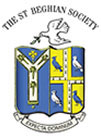|
 |
The Old St Beghian | |
| July 2025 | |||
Sam Ashton (SH 47-53) has submitted the following:
Thomas Fergus Robley (SH 48-51).
“Thomas was born on 28th June 1935 at Beckermet and came to St Bees just after the start of the spring term of 1948.
By his own admission he was no scholar, but did pass an unspecified number of subjects. However, he excelled in rugger, boxing, and squash.
Like all boys of his generation, he was called up for two years’ national service, which he did in the army with his local regiment, the Border Regiment. After basic training he was selected as an officer cadet and trained at Eaton Hall. Thereafter he served in two theatres with the Borders, in Egypt and in Germany.
After leaving the army Tom went to the Public Schools Appointment Bureau for some careers advice and they put him forward as a possible candidate to work with Brook Bond in East Africa, but first he would have to work on a farm in Sparsholt, Hants, for six months.
In 1955 he first met Mary Tombling and then again in 1956 after he had successfully completed the six month trial and was posted to Mufindi in Tanganyika/Tanzania. He communicated regularly by writing, as home leave was every three years for six months. He got engaged by post and recruited me as his Best Man by the same means. Their marriage was in Shrewsbury in 1960 with the service conducted by Mary`s brother John. In January 1965 daughter Angela was born at Iringa hospital and their son Fergus at Kitale in 1966.
In Tanganyika/Tanzania Tom started his career as a tea planter in the position of estate manager, then became a factory manager progressing to technical director.
During his time in Tanganyika/Tanzania he founded and was chairman of the Mufindi Rugby Football Club and was co-founder and captain of the Scorpions rugby team, which was Tanganyika’s unofficial touring team until 1974 when the invitation team became an East Africa Team based in Nairobi, Kenya.
In 1974 Tom was posted to Kericho, Kenya as the technical director of Brook Bond Kericho where he stayed for a further 21 years. When Brook Bond was acquired by Unilever in the 1980s, Tom was made de-facto M.D. of their plantations, which included tea, flowers, and sisal. On the one occasion I went to stay with him and Mary after we had both retired, he told me that the combined acreage was 35,000, half of which were Eucalyptus trees, felled on a rotation scheme for firewood to raise steam for the factory. The workforce for whom he was responsible was over 25,000, the largest single employer in Kenya, after the national government.
He retired in 1996 and before settling in Michelmersh (Hants) he and Mary spent six months circumnavigating the world and visiting people they had met in East Africa. This love of travel continued throughout their retirement with annual journeys back to Kenya and South Africa along with travels far and wide; the score of countries visited was sixty four and only stopped in 2021.
Once back in Michelmersh he embraced the role of church warden and then chairman of the Friends of Michelmersh Church. He also was a National Trust volunteer as tour guide for Montisfort Abbey. He died on the 18th of September 2024.
Postscript. In the spring term of 1948, I was Head of Baby Dayroom, School House. About two weeks after the beginning of term, John Robley, then in Junior Studies, appeared in the doorway accompanied by a taller younger lad with a genial expression and a broad smile. ‘Ashton, this is my baby brother Thomas; look after him.’ From that moment we were friends and remained so. When our taste buds developed to the point at which we had a taste for beer, we would down our Sunday lunch with haste and bike the four miles to the ‘White Lion’ at Beckermet, his home village, where Tom`s father, also large and genial, would stand us each to a pint of Younger`s bitter. We did bike rides on Sundays to other destinations; great was the freedom at St Bees in those days. During national service our paths crossed, first at H.Q. Lancastrian Brigade in the potential officers’ platoon in 1953 and then the next year at Eaton Hall Officer Cadet School.
When both of us had retired he told me that his calm and unruffled demeanour sometimes belied his inner turmoil when dealing with ‘differences’ with elements of his work force, but he stuck it out, and invariably won his point.”
Home
The St Beghian Society
St Bees School,
St Bees, Cumbria, CA27 0DS.
Tel: (01946) 828093 Email: osb@stbeesschool.co.uk
Web: www.st-beghian-society.co.uk
![]()